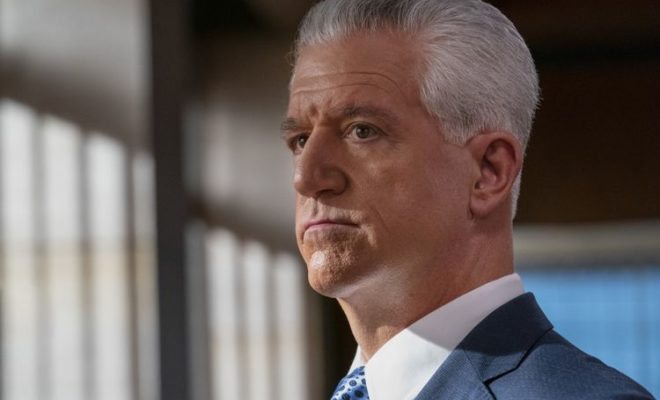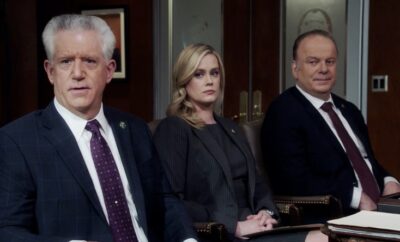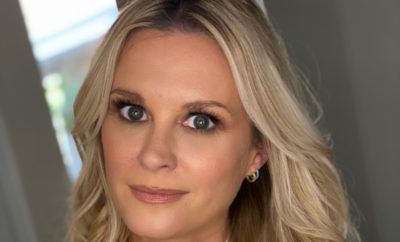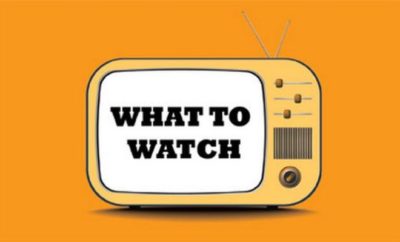 CBS
CBS
Interviews
Gregory Jbara – Blue Bloods
By: Jamie Steinberg
Q) Where do we pick up this season on “Blue Bloods?”
A) In terms of the timeline, the world of “Blue Bloods” is post COVID. It’s a decision to be a post COVID show because our Executive Producers realized that our show is an entertainment as opposed to a reminder of the darkness of the world that we’re living in. So, they thought it would be wise to have the timeline be post COVID. I know there is pressure on the networks to address all of the very important social issues that have been percolating while we’ve all been on lockdown. But our show has actually dealt with the issues that are sort of on the front page right now more than once even before they became headline issues. I think our show felt we didn’t have a job necessarily to specifically take on the civil unrest head on because we kind of do that all the time. The bottom line is our reality begins after the vaccine has come in and the pandemic has subsided.
Q) And where are we with Garrett?
A) Garrett is still Garrett. He is always in service to the Commissioner. I don’t think his role has changed. He’s always there to help the Commissioner keep a steady head on his shoulders – not forget his responsibility and his vital role in keeping the NYPD as a thriving entity that always lives in service to the city of New York.
Q) The Commissioner’s staff seems to share a familial bond with him and not just have simply a working relationship. What makes these close-knit relationships so functional?
A) Well, before I was hired to play the role…I know that Kevin Wade and Tom [Selleck] seriously discussed what that relationship would be with Garrett when the DCPI (Deputy Commissioner, Public Information) introduced to the show. The history of the actual character is that before Reagan became Commissioner, Garrett was a reporter for The New York Post who covered the NYPD. He was always the department’s most honest and probably microscopic critic of the NYPD. When Reagan became Commissioner, he already had a very respectful relationship with Garrett Moore as a reporter. He understood the hardships and had the ability to put on the page ideas that were vital to communicating to the public. So, I think it was a choice the Commissioner made to bring Garrett Moore on board because of his communication skills and because he’s a powerful voice at the New York Post and it would be much wiser to have him as an ally as opposed to an adversary. I do believe he brought him on because he knew how hard that job of being the Deputy Commissioner of Public Information was and he really believed that Garrett would be an asset. The truth is I got hired because Tom said, “I want Greg Jbara to play the role.” Tom and I had over twenty years of professional history together having started working together on the film In & Out and then “Blood Bloods” is actually the third TV drama that Tom has given me. The other two didn’t experience nearly the success as this one did. I don’t know where he got this insane perception of me as an actor, but gratefully he considers me someone that he likes to work with and has repeatedly called on me and offered me opportunities. This one just happened to be one that we both could ride for eleven seasons now, which is like Christmas every day for a working actor!
Q) How much input have you had in Garrett’s development as a character over the years?
A) Really little. I think the second episode that I ever did was at the end of Season One and there was a scene where Tom wasn’t happy with what was written. There was a conflict that Garrett had to step in and bust the Commissioners chops about how he’s dealing with the Mayor. Tom said, “What would you really say, Greg, if this was going on?” I replied, “If this was really going on, I would say, ‘You’re an idiot! What you did just there was stupid!’” Tom goes, “Alright. You should say that.” [laughs] I was like, “Oh! I better be careful about what I say because Tom is really listening to me. My character really does bust in the door and tells the Commissioner, “You’re an idiot!” He responds, “Thank you very much.” And then they go on to be absolutely candid. So, I think I understood very early on the relationship that these two characters had very early on was that they can speak from the heart without fear of consequence. Maybe there will be bruised egos. Maybe we are going to hear what we don’t want to hear from the other person, but I think that’s vital to the heart of their relationship. I can’t say it was something…People go, “Oh! You can tell how close you are in real life.” We did work together, but we didn’t spend a lot of time together on In & Out and we only shot one pilot. But Tom, gratefully, trusts me and I also get him. He is successful because he puts the people around him that will allow him to be him. Even though he’s not credited as a producer or writer, he is heavily involved in every aspect of the production of the show. He is even in the editing room after every episode. He’s an opinionated guy and he isn’t shy about if we’re in the middle of shooting something, a particular scene, he’ll just say, “What do you think about…” or “That might not work because…” Literally like right after a take! I think actors with more fragile egos might not be able to handle that kind of candor without taking it personally and I don’t because I know who he is and how he works. I think that’s probably beneficial as an actor that I don’t lead with my ego. I think I’m successful because I’m smart enough to listen to everybody and allow everyone to feel heard and then I get to make my choice. It’s probably the work and Tom’s feeling that he can be himself and that he knows that I won’t blanche or be hurt or be shut down by anything he may say or take it personally. It’s worked out great – the work relationship.
Q) What have been some of your favorite episodes to have worked on?
A) Garrett is constantly getting offered jobs, for different reasons, to leave the department. There was an episode where Garrett gets offered a job to work at the University of Indiana. It was at a time when the Commissioner was considering walking away from his job and he wanted to make sure that all of his staff had a parachute. The final scene in that episode was the Commissioner telling Garrett that he really would rather Garrett stay and not take this job. I’m not articulating this properly, but it was the writing in this episode that paralleled the real relationship that Greg Jbara has with Tom Selleck. It was like uncannily similar and it was the Commissioner…It was the two of them baring their souls that if they had their way…And Garrett said he’d happily take less money and stay to work with the Commissioner because of their mutual love and respect for one another. The first time we shot it we will attest that it was probably much more emotionally charged. There were literally about to break out handkerchiefs and dry our eyes. We realized it was a little too sentimental to work and we had to be a little steelier in our admissions for caring for each other. That would better serve the story, putting a lid on the emotions. But it was so easy to play. We did that first take and everybody just came up in the Video Village (which is where all the directors and the department watch off set) and said, “Oh my God! We were crying like babies! Why did you guys do that?!” And we both said, “Well, we really weren’t acting. We kind of just were allowed to say how we really feel.” It’s wonderful and powerful stuff! I think that is still emblazoned in my mind as probably one of the most gratifying episodes because it was really an opportunity to just live the gratitude I really have as an actor for Tom. Eleven years of job security is a miracle for an actor, especially one who has two sons – one in his second year of college and one in his third year of high school. To be able to put food on the table and to be able to provide for your family as an actor is a miracle. All of that was underneath performing that particular episode. It was beautiful, fun and cathartic and not difficult at all.
Q) What do you think it is about “Blue Bloods” that continues to make it such a fan favorite series?
A) Well, I think at the heart of it is the family structure. That Sunday dinner. I know growing up as a Catholic that it was also required. The norm. Everybody was home and we all had dinner together. That’s when, whether difficult or easy, everybody gets to share and appreciate each other or voice concerns. On an international level those who used to have that…I don’t know that it is necessarily…Everybody is going on so many directions that it’s difficult to do that these days as a family. But I think it’s valued nostalgically by our older viewers and I think that family dinner is envied or valued at least by our younger viewers who yearn for that kind of structure and/or family connection. The world is moving so quickly that the opportunity for that sort of thing that happened naturally in the 50’s and 60’s because I think it wasn’t until the advent of TV dinners and dinner trays where families started to disconnect during meals and started watching television. Meals then became events where they would watch “The Ed Sullivan Show” or “The Colgate Hour” or whatever. I think it’s the many generations of family and also I believe our show…I don’t feel our show is preachy at all. I think our show barely chews on both or all sides of any particular social issue or conflict and doesn’t tell the viewer what they are supposed to think or feel. It allows the argument, the debate, for both sides to have oxygen. I think that’s also the success of the show. I don’t think any one person has to go, “This is definitely a Republication show” or “This is definitely a “Democratic show.” I think all sides of social issues and personal issues get vital and important air time so there is a healthy debate in a viewer’s mind. They get challenged perhaps to think about things on their own.
Q) What would you like to say to everyone who are fans and supporters of you and the work you do?
A) I would say that I am profoundly grateful for the support and the appreciation of the storytelling that we try to do. It is a gift to have a job as an actor that has gone on for eleven years. It is not lost on us that if it weren’t for people watching the show that we would not have a job. So, the fact that everyone still tunes in…I think our season premiere was only 6.5 billion viewers live. Early days it would be more than ten and we’ve averaged more about (depending on the year) at least eight to ten million in a season premiere. So, even though there is only 6.5 the world is in an upheaval. But I hadn’t seen the numbers, but I know with the streaming platforms our producers sent out an email saying that we’re in great shape and CBS is thrilled with how we are performing. But that performance really comes down to if there are fans who watch the show. Without the audience there is no us. So, I have nothing but gratitude. A script probably gets rewritten five times in the final week before we start shooting it. Then, it’s changed every scene every day. It’s just nice to know that when we’re working hard to make sure that we’re not condescending to our viewership and we’re grateful that the fans do show up every week and in syndication! From a theater actor who spent twenty-five years doing mostly stage to suddenly being on this show that has just had probably the last of an era of network TV success as all the other streaming platforms come in…I know I said this earlier, but we’re all just profoundly grateful.





You must be logged in to post a comment Login